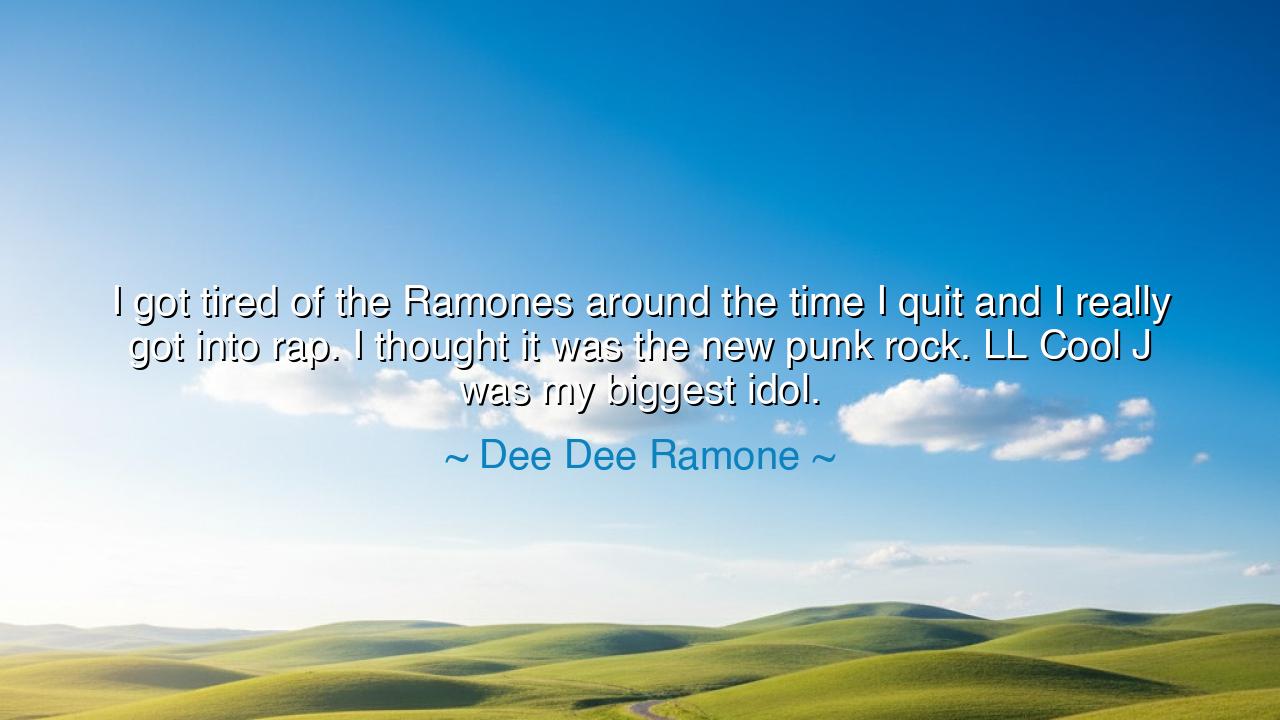
I got tired of the Ramones around the time I quit and I really
I got tired of the Ramones around the time I quit and I really got into rap. I thought it was the new punk rock. LL Cool J was my biggest idol.






On Rebellion, Renewal, and the Eternal Spirit of the Outsider
When Dee Dee Ramone, the wild heart of punk rock, declared, “I got tired of the Ramones around the time I quit and I really got into rap. I thought it was the new punk rock. LL Cool J was my biggest idol,” he was not merely confessing a change in musical taste — he was uttering a truth about the nature of rebellion, creation, and the restless human spirit. His words speak of renewal, of the eternal fire that drives the artist to seek what is raw, real, and alive. For punk was never just a sound — it was a defiance, a refusal to bow before the polished and the false. And when that spirit began to fade, Dee Dee, the eternal rebel, went in search of its next incarnation — and found it, unexpectedly, in rap.
In the time of the Ramones, punk was a revolution against complacency. It tore down the walls of excess and pretension in music, reminding the world that truth could be shouted, not sung, and that passion mattered more than perfection. But all fires, if not fed, turn to ash. What was once a cry of liberation can become, in time, a cage of repetition. Dee Dee, who had poured his soul into that sound, felt the weight of its sameness. His weariness was not of the band, but of the stagnation that follows when rebellion becomes routine. So, he sought a new frontier — a new voice for the voiceless — and he found it in the rising storm of rap music, where words replaced guitars, but the anger, honesty, and hunger remained the same.
When Dee Dee called rap “the new punk rock,” he was naming a truth that the wise have always known: that the essence of rebellion is not confined to form, but to spirit. The ancient philosophers might have said that the soul of punk is logos, the living fire of authenticity that moves from vessel to vessel through time. In one era, it burns in guitars and leather jackets; in another, in beats and rhymes. The outsider’s cry — the demand to be heard, the refusal to submit — is eternal. Dee Dee, in recognizing this, became not a deserter of his cause, but a prophet of its evolution.
So it was in all ages. When the great Socrates challenged the thinkers of Athens, he was the punk of philosophy — loud in his silence, disruptive in his questions. When Vincent van Gogh abandoned the conventions of art to paint the world as he felt it, he was a punk with a brush. And when the poets of Harlem took the rhythms of the street and made them into song, they too carried the torch of rebellion. LL Cool J, the idol of Dee Dee’s second awakening, was not so different from the young punks of New York — he too stood against the mainstream, he too crafted beauty out of struggle, and he too spoke for those the world ignored.
Dee Dee’s shift from punk to rap reminds us that art must evolve, or else it dies. The artist who clings to what once worked becomes a guardian of ghosts. To live creatively is to change, to wander, to seek new forms for ancient truths. Just as the seasons renew the earth, so must the soul renew its song. Dee Dee understood that rebellion is not tied to guitars or chords, but to courage — the courage to break one’s own patterns, to begin again. He did not betray punk; he honored it by finding its new voice.
And yet, his words also carry a quiet sadness — the weariness of one who has fought too many wars, shouted too many truths into a deaf world. Like many artists before him, Dee Dee was both warrior and wanderer, forever chasing the horizon where art and freedom meet. His story reminds us that even the fiercest spirit must rest, and that every revolution, no matter how loud, must eventually give way to a new generation of dreamers. The torch must pass, or else its light fades.
The lesson, then, is this: do not cling to the form of your passion — cling to its fire. Whether you are an artist, a worker, a thinker, or a dreamer, know that the spirit of creation lives not in repetition, but in renewal. When your song grows dull, do not despair — listen for the new rhythm rising beyond the noise. It may come from a place you never expected, but if it stirs your soul, follow it. As Dee Dee Ramone did, leave behind what no






AAdministratorAdministrator
Welcome, honored guests. Please leave a comment, we will respond soon